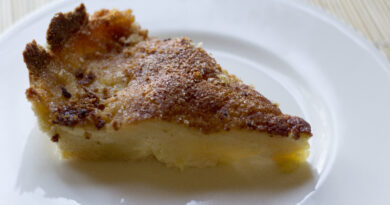Bolo caseiro (Homemade cake)
The Sweet Magic of Home: Crafting the Perfect Bolo Caseiro (Homemade Cake)
Introduction
In the heart of every home kitchen, there exists a tradition that transcends generations and cultures—the art of baking a homemade cake, or as it’s lovingly called in Portuguese, Bolo Caseiro. A homemade cake is more than just a dessert; it’s a celebration of love, a slice of nostalgia, and a testament to the warmth of family gatherings. In this blog post, we’ll embark on a delightful journey to explore the cultural significance, the joy of baking, and the secrets behind creating the perfect Bolo Caseiro, capturing the essence of homemade happiness.
Cultural Roots: Bolo Caseiro as a Culinary Heritage
Bolo Caseiro is deeply woven into the culinary fabric of various cultures, especially in Portugal and Brazil. In Portuguese, “bolo” means cake, and “caseiro” translates to homemade. It’s a term that embodies the simplicity and authenticity of a cake crafted with care in one’s own kitchen. Each region and family may have its unique recipes, passed down from grandmothers to mothers, and now to a new generation of home bakers. This cultural inheritance transforms Bolo Caseiro into more than just a dessert—it’s a cherished tradition that binds families together.
The Aroma of Memories: Baking as an Emotional Experience
Baking a homemade cake is a multisensory experience. The aroma of vanilla, the warmth of the oven, the tactile pleasure of mixing flour and sugar—these sensations evoke memories of childhood, family gatherings, and special occasions. The process of baking becomes a meditative ritual, allowing the baker to pour their love and emotions into every ingredient. Whether it’s the anticipation of a birthday party or the comfort of a quiet afternoon, Bolo Caseiro carries with it the emotional resonance of the moments it graces.
The Art of Crafting: Secrets to a Perfect Bolo Caseiro
Creating the perfect Bolo Caseiro involves a delicate balance of ingredients, techniques, and a sprinkle of creativity. Here’s a step-by-step guide to help you master the art of crafting this homemade delight:
Ingredients:
- 2 cups all-purpose flour
- 1 ½ cups granulated sugar
- 1 cup whole milk
- 1 cup unsalted butter, softened
- 3 large eggs
- 1 tablespoon baking powder
- 1 teaspoon vanilla extract
- Pinch of salt
Method:
- Preparation: Preheat your oven to 350°F (175°C). Grease and flour a cake pan.
- Mixing: In a large bowl, cream together the softened butter and sugar until light and fluffy. Add the eggs, one at a time, beating well after each addition. Stir in the vanilla extract.
- Sifting and Combining: In another bowl, sift together the flour, baking powder, and salt. Gradually add the dry ingredients to the wet ingredients, alternating with the milk. Begin and end with the flour mixture.
- Baking: Pour the batter into the prepared cake pan and smooth the top with a spatula. Bake in the preheated oven for 45-50 minutes or until a toothpick inserted into the center comes out clean.
- Cooling and Serving: Allow the cake to cool in the pan for 10 minutes before transferring it to a wire rack to cool completely. Dust with powdered sugar or frost with your favorite icing before serving.
Embracing Varieties: Exploring Flavors and Toppings
One of the joys of Bolo Caseiro is its versatility. Depending on personal preferences and regional influences, the cake can take on various flavors and toppings. Some may opt for a classic vanilla cake, while others might infuse it with citrus zest, chocolate chips, or spices like cinnamon and nutmeg. The toppings can range from a simple dusting of powdered sugar to elaborate buttercream decorations, fresh fruits, or even a drizzle of caramel. Each variation adds a unique touch, transforming Bolo Caseiro into a canvas for culinary creativity.
Sharing the Love: Bolo Caseiro in Community and Celebration
Bolo Caseiro is not just a dessert; it’s a gesture of love and sharing within communities. It graces the tables of family reunions, birthdays, weddings, and religious festivals, symbolizing the sweetness of togetherness. In Brazil, for instance, it is a common sight at Festa Junina, a traditional June festival celebrated with music, dance, and delicious homemade treats. Bolo Caseiro becomes a centerpiece, inviting neighbors and friends to gather, share stories, and indulge in the joy of homemade goodness.
Conclusion: The Heartfelt Legacy of Bolo Caseiro
In every slice of Bolo Caseiro, there is a story—a story of tradition, love, and the joy of simple pleasures. It embodies the essence of home, carrying with it the warmth of family kitchens and the laughter of shared moments. Baking a homemade cake is not merely a culinary endeavor; it’s a way of preserving heritage, creating memories, and nurturing the bonds that tie us together. So, the next time you embark on the delightful journey of baking a Bolo Caseiro, remember that you’re not just making a cake; you’re weaving a tapestry of tradition, one that will be savored and shared, leaving a trail of sweetness in its wake.



